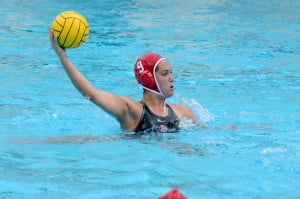The Stanford women’s water polo team’s season came to an end in heartbreaking fashion on Sunday afternoon in Boston as the No. 2 Cardinal lost 10-9 to No. 1 USC in the fifth overtime period of the national championship game–the longest women’s water polo NCAA championship game in history. Stanford finished the season 29-3, with all three losses coming at the hands of the Women of Troy.
The Cardinal had won the previous two national titles, but the chance at a three-peat ended abruptly when USC freshman Anni Espar fired home a shot in the third period of sudden-death overtime and the fifth overtime period overall.

Stanford led for the majority of the game before USC put together a furious comeback late in the second half. After the Women of Troy took their first lead in the final minute, Stanford sophomore Ashley Grossman scored with 12 seconds left in the game to force overtime.
Stanford had the better scoring opportunities throughout the game, but USC’s efficiency on the power play combined with USC goalkeeper Flora Bolonyai’s 17 saves ultimately proved to be the difference.
The Cardinal reached the final game by crushing Iona 20-3 in the first round of the tournament and then sliding past UCLA 5-3 in the semifinals to set up a fourth meeting with the Trojans this season. Coming into the game, USC had won two of three previous meetings, including an 11-7 victory in the Mountain Pacific Sports Federation (MPSF) Tournament Final on April 28.
Before the weekend, Stanford head coach John Tanner had said that getting off to a quick start would be key for his team. The Cardinal took that message to heart in the championship game as they broke out to a 3-0 lead early in the second quarter behind goals from freshman Maggie Steffens, senior Melissa Seidemann and junior Kaley Dodson.
Early in the game, Stanford’s defense completely stifled USC’s attack and allowed very few clean looks at goal. When shots did get through, senior goalkeeper Kate Baldoni, who made 11 saves on the day, was there to keep the ball out of the net.
The Women of Troy finally got on the scoreboard on a 6-on-5 opportunity with 6:05 remaining in the first half and then added a second goal a minute later when USC’s Nicolina McCall backhanded a shot past Baldoni. After Stanford sophomore Kiley Neushul put away an outside shot, USC’s Madeline Rosenthal took advantage of another power play opportunity to make the score 4-3 going into halftime.
The back-and-forth action continued after the break as the Cardinal maintained the lead but was unable to pull away. Dodson and Seidemann both scored in the third quarter, but after each tally USC junior Hannah Buckling—who had a game-high five goals—answered to keep the Women of Troy within one.
Stanford clung to its 6-5 lead deep into the fourth quarter until Buckling came up big once again. With just under two minutes to go in the game and two seconds on the shot clock, the junior skipped a long shot past Baldoni to tie the game for the first time since 0-0.
USC capped off the comeback when Espar scored to give USC a 7-6 lead with just 45 seconds remaining the game—the first time the Trojans had led all game.
On the ensuing possession, the Cardinal drew an exclusion and coach John Tanner called timeout. Junior Annika Dries had the first attempt for Stanford, but Bolonyai made a huge save to preserve the lead. The Cardinal maintained possession and worked the ball inside to Grossman, who poked it past Bolonyai to keep Stanford’s hopes alive.
NCAA rules dictate that once teams enter overtime, they will play two three-minute periods regardless of score. If the game is still tied after the guaranteed six minutes, then sudden death comes into play.
USC scored to open overtime, but Steffens added her second goal with 10 seconds remaining in the first period. Dodson, who won all nine sprints on the day, gave the Cardinal possession to open the second period and Stanford took advantage when Seidemann put away her third goal of the game to give the Cardinal a 9-8 lead.
But another Stanford exclusion gave USC the chance to tie and Buckling capitalized once again to even the game with 55 seconds to go.
Both defenses locked down as they entered sudden-death overtime. Stanford continually forced USC into turnovers or weak attempts at goal, but was unable to take advantage at the other end. In the second sudden-death period, USC had close to a minute of sustained possession but Baldoni and her defense stood tall. When the Cardinal finally got the ball, Seidemann fired two rockets that hit the crossbar and stayed out.
In the fifth period of overtime, the Cardinal seemed to be on the verge of breaking through as Seidemann, Dries and Steffens all had good looks at goal, but Bolonyai came through time and time again to keep the ball out.
After more than 45 minutes of play, Espar finally ended the game by placing an outside shot past Baldoni, off the crossbar and down into the net, and with that, the Cardinal’s hopes of a three-peat were extinguished.
Although the Cardinal only lost three games all year, a team that was billed as potentially one of the best teams in collegiate water polo history ends the season in disappointment after failing to capture either the conference or the national title.
The loss also puts the Stanford athletic program’s record of 36 straight years with a national championship at risk. The Cardinal has yet to win an NCAA title in 2012-13—the synchronized swimming national title came from U.S. Collegiate competition—and many observers believed that the women’s water polo team was Stanford’s last legitimate chance at earning a championship this year.
Contact Jana Persky at jpersky “at” stanford.edu.
